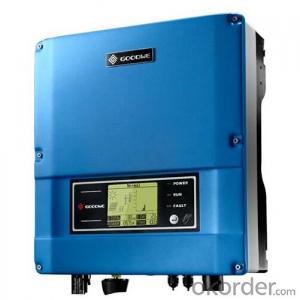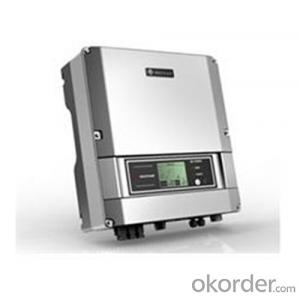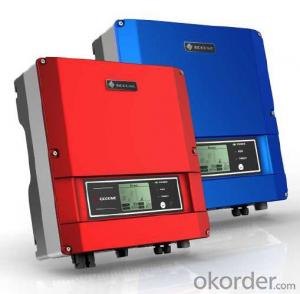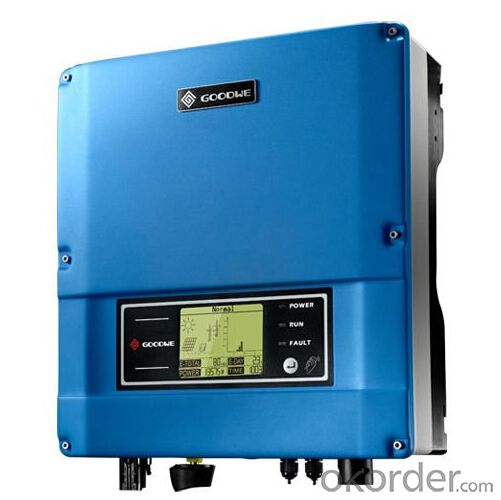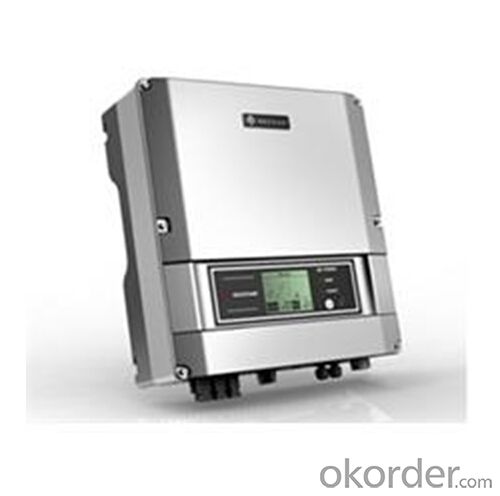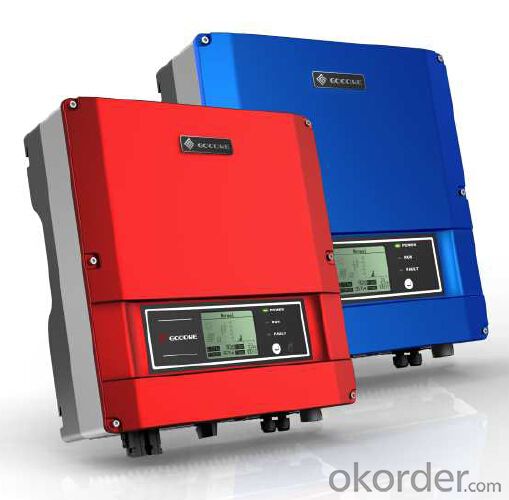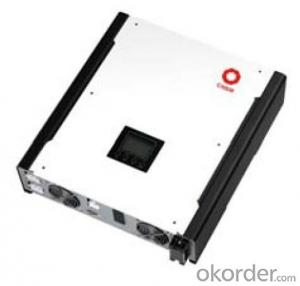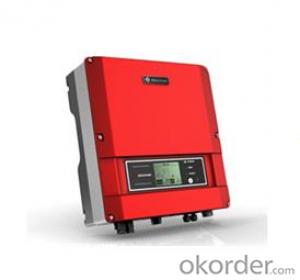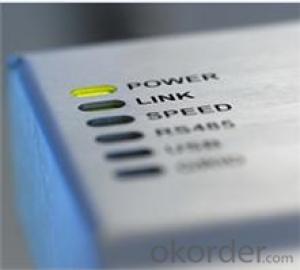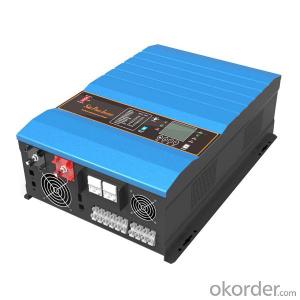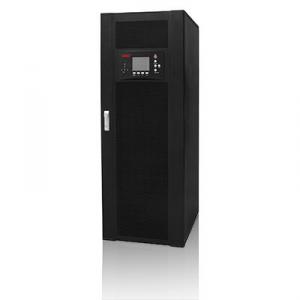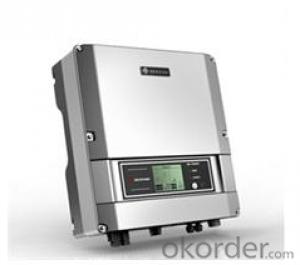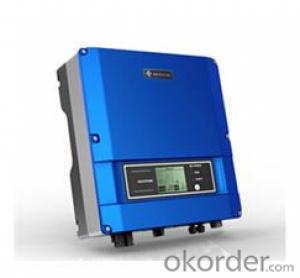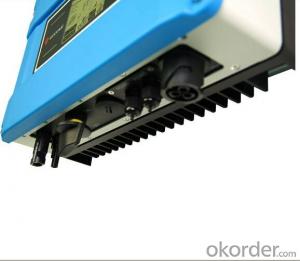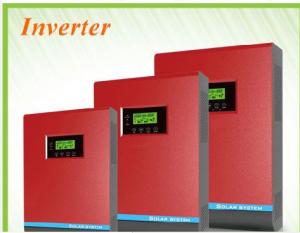Solaris Solar Inverter GW2000-SS
OKorder Service Pledge
Quality Product, Order Online Tracking, Timely Delivery
OKorder Financial Service
Credit Rating, Credit Services, Credit Purchasing
You Might Also Like
GW2000-SS photovoltaic inverter is suitable for home rooftop photovoltaic system,
designed under modern industrial concept. There are three colors for option with fashionable appearance.
This model uses state-of-the-art control technology, which has an extremely powerful input voltage and input current capability.
The THDi can be controlled within 1%, when the maximum output power of PV system ranges from1800W to 2300W. It holds a safe lead among similar products.
Datasheet
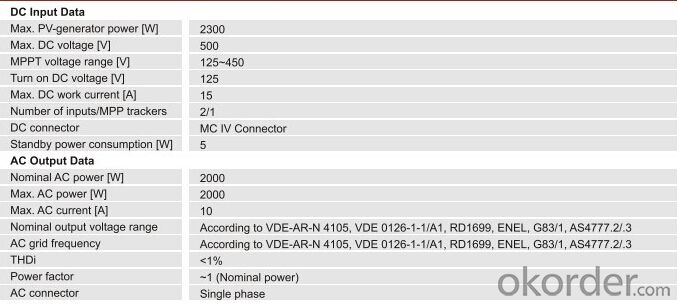
- Q: How does a solar inverter handle voltage drop?
- A solar inverter handles voltage drop by continuously monitoring the voltage levels from the solar panels. It adjusts its output voltage accordingly to ensure that the electricity being produced is compatible with the grid or the appliances it is connected to. This helps to compensate for any voltage drop that may occur due to factors such as distance, resistance, or shading, thereby maintaining a consistent and stable power supply.
- Q: Can a solar inverter be used in a three-phase power system?
- Yes, a solar inverter can be used in a three-phase power system. In fact, three-phase solar inverters are commonly used in commercial and industrial applications where the power demand is higher. These inverters are designed to convert the direct current (DC) generated by solar panels into alternating current (AC) that is compatible with a three-phase power system.
- Q: What is the maximum number of AC outputs in a solar inverter?
- The maximum number of AC outputs in a solar inverter can vary depending on the specific model and design, but typically it ranges from one to three AC outputs.
- Q: Can a solar inverter be used with a solar-powered desalination system?
- Yes, a solar inverter can be used with a solar-powered desalination system. A solar inverter is responsible for converting the direct current (DC) produced by solar panels into alternating current (AC) that is required to power electrical devices. In the case of a solar-powered desalination system, the solar panels generate DC electricity, which is then converted by the inverter to AC power to operate the desalination system's pumps, motors, and other electrical components. This allows the system to utilize solar energy efficiently and sustainably for the desalination process.
- Q: Photovoltaic grid-connected inverter problem
- But Baidu Encyclopedia clearly pointed out: the zero line is the secondary side of the transformer leads the neutral point of the line, and the phase line constitutes a circuit for power supply equipment.
- Q: What is the role of a solar inverter in a net metering system?
- The role of a solar inverter in a net metering system is to convert the direct current (DC) electricity generated by the solar panels into alternating current (AC) electricity, which is compatible with the electrical grid. The inverter also synchronizes the solar system with the grid, ensuring that excess electricity generated by the solar panels is fed back into the grid, allowing for net metering and the possibility of earning credits for the surplus energy generated.
- Q: How does a solar inverter impact the overall system reliability?
- A solar inverter plays a crucial role in the overall system reliability of a solar power system. It converts the direct current (DC) generated by solar panels into alternating current (AC) that can be used to power homes and businesses. By efficiently managing the power output and ensuring proper voltage levels, a solar inverter helps maintain the stability and reliability of the system. It also includes protective features that safeguard the system from potential issues like overvoltage, overcurrent, and short circuits. Therefore, a high-quality solar inverter positively impacts the overall system reliability by ensuring optimal performance and protecting against potential faults or failures.
- Q: What is the role of a voltage regulation feature in a solar inverter?
- The role of a voltage regulation feature in a solar inverter is to ensure that the voltage output from the solar panels is maintained at a stable and optimal level. This helps to protect the sensitive electrical components in the solar inverter and other connected devices, while also maximizing the efficiency and performance of the solar power system.
- Q: Can a solar inverter be used in low light conditions?
- Yes, a solar inverter can be used in low light conditions. However, the efficiency of the solar inverter decreases as the amount of available sunlight decreases. Therefore, it may not be as effective in converting solar energy into usable electricity in comparison to bright sunny conditions.
- Q: Can a solar inverter be used with different types of grounding materials?
- Indeed, various grounding materials can be employed in conjunction with a solar inverter. Nevertheless, it is crucial to verify that the grounding system aligns with the manufacturer's prescribed specifications and guidelines for the specific solar inverter. The selected grounding materials must adhere to the essential safety standards and furnish adequate electrical grounding for the solar setup. It is advisable to seek guidance from a certified electrician or solar expert to ascertain the fitting grounding materials for your particular solar inverter and installation.
Send your message to us
Solaris Solar Inverter GW2000-SS
OKorder Service Pledge
Quality Product, Order Online Tracking, Timely Delivery
OKorder Financial Service
Credit Rating, Credit Services, Credit Purchasing
Similar products
Hot products
Hot Searches
Related keywords
